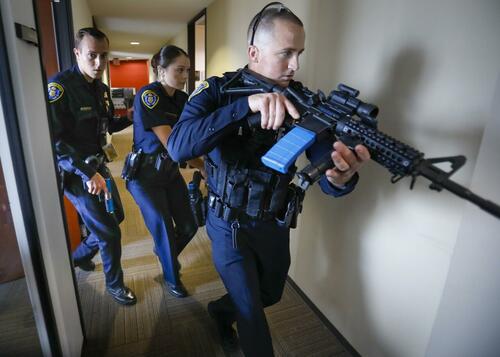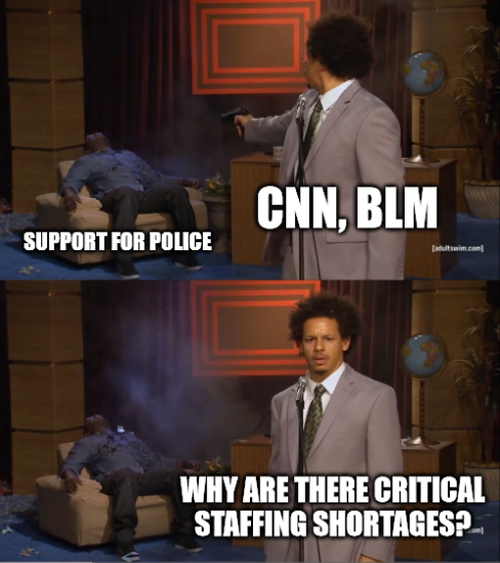“Its Critical”: Police Departments Across US Struggling With Staffing Shortages
After years of supporting BLM activists who succeeded in defunding police departments in major American cities, CNN is now reporting that there are ‘critical staffing shortages’ in precincts across the country.
Police departments from Atlanta to Kansas City to Portland are coping with critical staffing shortages and struggling to fill their ranks from patrol officers to 911 operators, as the warm weather historically portends bursts of violence in many parts of the United States. -CNN
“The people (who) work here are working long hours, extra overtime to cover other shifts,” said Kansas City Police Interim Chief Joseph Maybin. “But we have to have someone answering the call. We have to have someone dispatching otherwise we can’t get officers to people. It’s critical.”
“We’re stretched thin,” Maybin added – while dealing with a shortage of around 100 crucial non-law enforcement positions such as 911 dispatchers, mechanics and analysts, as well as more than 200 officers. “But the one thing that we can’t take away from is … emergency response.”
Meanwhile, Dallas is down around 550 officers, Portland needs 100 more, and Seattle’s shortage of officers has led to the reassignment of detectives from sexual assaults to fill gaps in other areas.
On Monday, Chicago Police Superintendent David Brown asked for the city’s “continued support and prayers” after the department’s third suicide of an officer in the last month.Brown also addressed concerns over the department’s canceling of days off during the summer, noting that “historically the most violent weekends of the year” in the city have been Memorial Day, Father’s Day, July Fourth and Labor Day weekends. -CNN
As Michael Shellenberger wrote last Novermber; In response to anti-police protests, many officers quit, resulting in shortages and a spike in avoidable deaths, from homicides to heart attacks, of innocents…
Before a vaccine mandate took 100 police officers off the street in mid-October, the Seattle police department was short at least 400 police officers to be at the minimum considered necessary to protect public safety. Why is that?
The overwhelming and unavoidable reason is anti-police protests by Black Lives Matter activists. This happened nationwide, but was worse in Seattle, where Seattle Mayor Jenny Durkan and progressive members of the Seattle City Council allowed anarchists to briefly take over the downtown Capitol Hill neighborhood in the summer of 2020. Durkan did so to show solidarity with anti-police protests in the wake of the killing of George Floyd by a police officer in Minneapolis.
The anti-police protests in Seattle were surprising because in 2018 the City Council had hired a black woman, Carmen Best, for the first time to serve as the city’s police chief. Best opened up for the first time about what happened last summer in an interview with me for my book, “San Fransicko,” earlier this year. Best is also one of the candidates NYC’s Mayor-Elect Eric Adams is considering for NYPD Commissioner.
“I refuse to work for this socialist City Council and their political agenda,” said one officer. “It ultimately will destroy the fabric of this once fine city.” Another said the city’s progressive City Council “will be the downfall of the city of Seattle.”
* * *
To entice more people to join the force, police departments have started offering bonuses to new officers, as well as ‘educational stipends’ and other incentives to current members.
“I’m looking for 250 officers and we’re finding them. People are answering the call,” said Atlanta Mayor Andre Dickens. “They’re saying they want to serve their city.”
A June 2021 national survey found a 45% increase in retirements and an 18% jump in resignations over the previous year. And with the average new officer requiring an 8-month training program before they can patrol the streets alone, it will take years to fill the officer shortfall across the country.
The reasons for the recruitment and retention crisis are attributable to “multiple social, political, and economic forces,” including generational differences, negative perceptions of policing and the long hiring process of many agencies, according to a September 2019 survey by the International Association of Chiefs of Police.additionally, low pay and the so-called great resignation — in which workers voluntarily left their jobs in unprecedented numbers after the pandemic — hit policing as it did other professions. -CNN
Tyler Durden
Wed, 07/20/2022 – 22:00
via ZeroHedge News https://ift.tt/UfYNvld Tyler Durden


